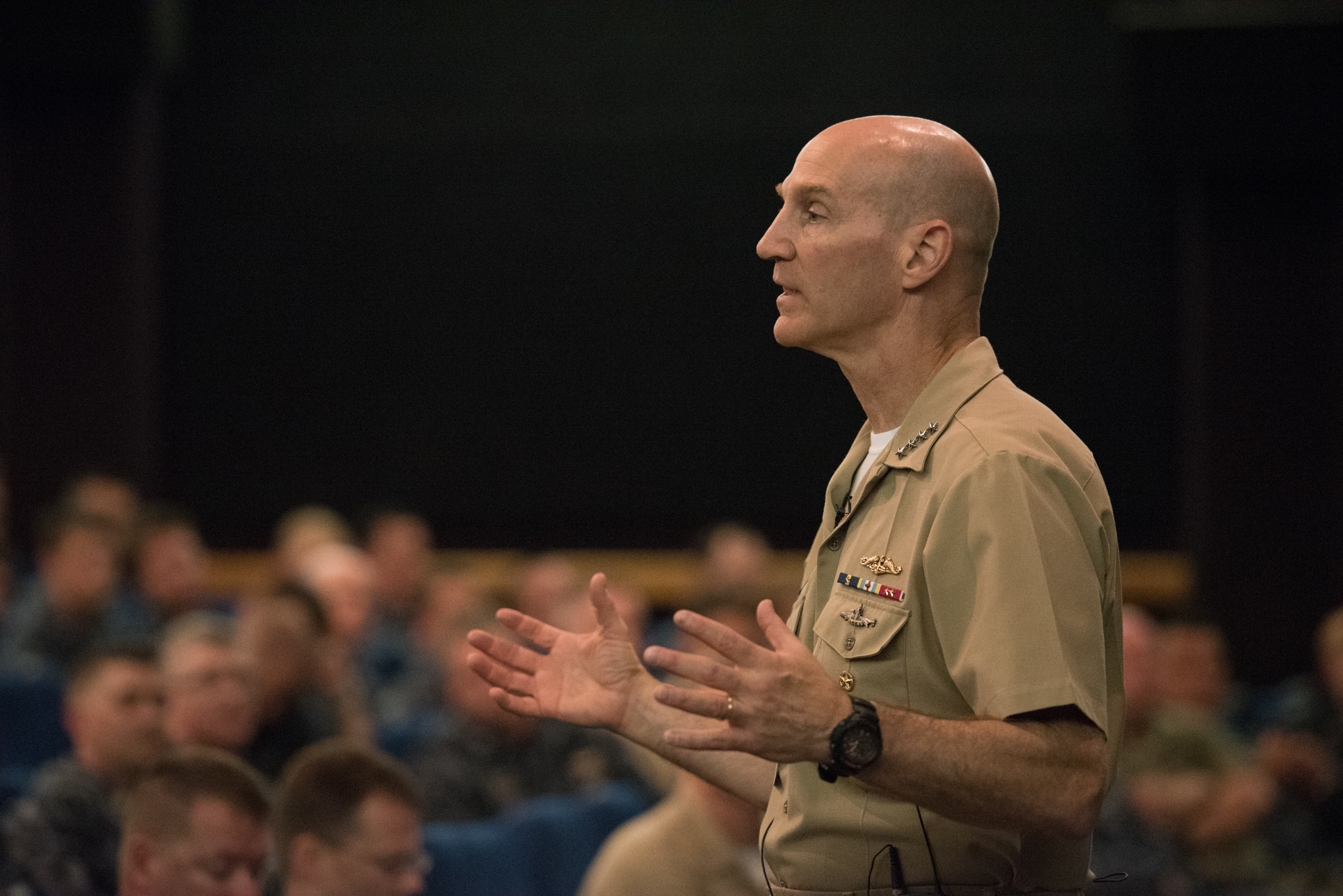
A military judge has disqualified Director of Naval Reactors Adm. Frank Caldwell from overseeing the upcoming negligence trial of the former USS Fitzgerald (DDG-62) commander due to actions Caldwell made during other legal proceedings related to the fatal 2017 collision, according to a copy of a Tuesday ruling obtained by USNI News.
Caldwell serves as the consolidated disposition authority all administrative and punitive actions related to two fatal ship collisions from 2017, in an effort to ensure parity in how those deemed responsible are punished.
However, a judge found that, in handling other cases related to the Fitzgerald collision, Caldwell showed he thought commanding officer Cmdr. Bryce Benson was directly responsible for the mishap that killed seven sailors off the coast of Japan. According to the judge’s ruling, Caldwell used the non-judicial punishment process for other Fitzgerald sailors to gather evidence against Benson. Caldwell asked a series of specific questions about Benson’s leadership on the ship’s bridge and in the combat information center during a Jan. 25, 2018, NJP hearing of three other sailors, according to the ruling. That hearing occurred before the criminal charges against Benson were referred for court-martial.
“ADM Caldwell had the resources available to answer his questions without inserting himself into the investigative process, yet he chose to ask the questions anyway,” reads the ruling from judge Capt. J.T. Stephens.
“The court finds that the only reasonable explanation was that the questions indicated an attempt to elicit further evidence against the accused, who was already facing a court-martial.”
Stephens said that Caldwell also showed bias during a related March 3, 2018, non-judicial punishment proceedings in which the admiral said the “commanding officers and other members of FTZ and MCCAIN were directly responsible for and could have prevented, the collisions,” referring to the July 2017 Fitzgerald collision and the August 2017 USS John S. McCain (DDG-56) collision.
The combination of both the questions at the Jan. 25 NJPs and the statement related to the March case were enough to disqualify Caldwell as a neutral convening authority.
“While complete and absolute neutrality is neither realistic nor required from a [convening authority] under the [Uniform Code of Military Justice], the court finds that ADM Caldwell’s pronouncement of the accused’s guilt further demonstrates that he had assumed a prosecutorial role in this case,” Stephens wrote.
In a statement to USNI News, the Navy said it was “reviewing the court’s ruling and assessing legal options in this case. All future action will be in the best interest of justice.”
The military judge said a separate issue, brought up by the defense, of Caldwell sending regular updates to the Office of the Secretary of the Navy and the Vice Chief of Naval Operations on the status of the case did not violate his neutrality mandate as the CDA.
While Caldwell is now disqualified from overseeing the Benson case, the government can still pursue the criminal negligence and hazarding charges against the former Fitzgerald commander, albeit under a different CDA.
Former Marine and military attorney Rob “Butch” Bracknell told USNI News on Wednesday that the ruling was in line with previous cases related to the bias of convening authorities.
The ruling “doesn’t really affect the government that much. It’s inconvenient and a little embarrassing to Adm. Caldwell, but that’s about it,” he said. “In this case, it appears the Navy will have to find a new four-star to act as the CDA.”
However, who that could be in the Navy is a short list.
In an earlier motion ruling in the Benson case, Stephens found Chief of Naval Operations Adm. John Richardson and VCNO Adm. Bill Moran had exercised unlawful command influence in how they spoke publicly about the cases, which would all but disqualify them from the job.
Likewise, since both collisions happened in the Western Pacific, appointing the U.S. Pacific Fleet commander would be unlikely because of perceptions of neutrality. And four-star combatant commanders – Navy admirals currently lead U.S. Indo-Pacific and U.S. Southern commands – don’t typically act as CDAs, Bracknell said.
“It’s possible they could ask a neutral and senior Marine three-star to act as the CDA, though it’s doubtful, because the issues of criminal liability are somewhat technical and tied to seamanship,” Bracknell said.
Current U.S. Fleet Forces Command commander Adm. Chris Grady and commander of U.S. Naval Forces Europe Adm. James Foggo have largely not been involved in the progression of the investigation and the disciplinary action related to the collisions, USNI News understands.
For now, the case against of Benson is on hold until a new CDA can be appointed. Benson had originally faced more serious charges, including negligent homicide, for his role in the collisions but were dropped last summer.





